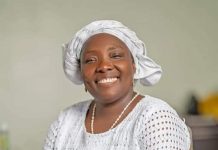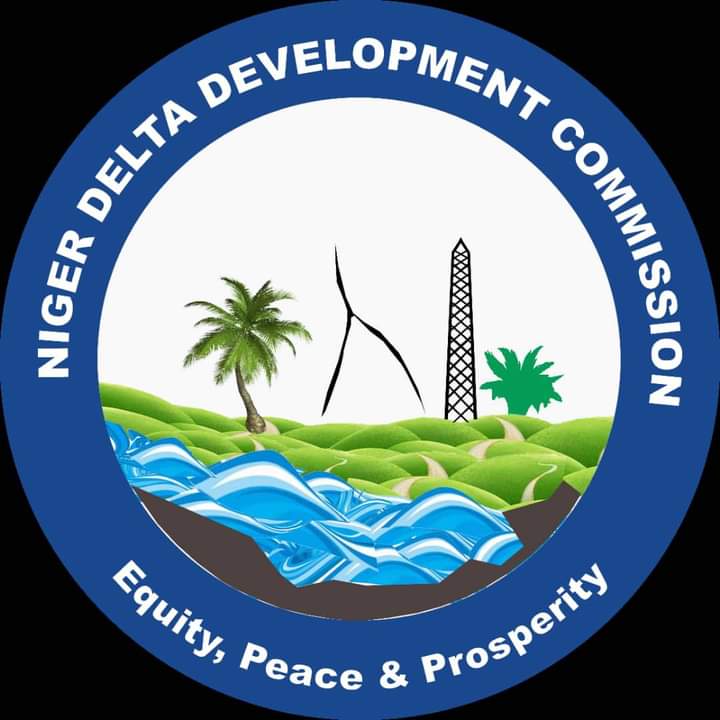By: Wilbet Ijeoma
A partnership of Civil Society in Malaria Control, Immunization and Nutrition (ACOMIN), Network of People Living with HIV and AIDS in Nigeria (NEPWHAN), and Tuberculosis Network (TB Network) with its implementing ATM Network, in a media round-table meeting with Delta State Agency for the Control of HIV/AIDS (SACA), Delta State Primary Health Care Development Agency, Civil Society Organizations (CSOs), Community Based Organizations (CBOs), religious leaders and gentlemen of the Press, expressed its renewed bid and collaboration in implementing the community component of the COVID-19 Response Mechanism (C19RM) Grant in Delta State in response to emerging diseases and epidemics.
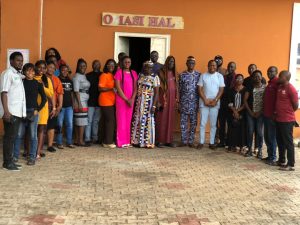
The event which took place at Bellwood Hotel Asaba Delta State on Friday 28th June 2024 was mediated by the Press, bringing together critical stakeholders in Delta State Primary Health Development Agency, Delta State Agency for the Control of HIV/AIDS (SACA), State Epidemiology Unit of the Ministry of Health and Civil Society Organizations (CSOs) at community level, and graciously attended by religious and other opinion leaders in the State, to chart a way forward in addressing the prevalence of AIDS, Tuberculosis and Malaria (ATM) and reaching out to target audience with healthcare support in Delta communities.
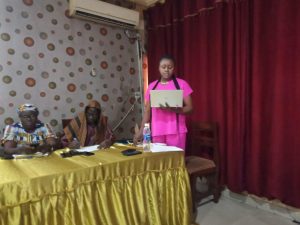
The media briefing organized by AIDS, Tuberculosis and Malaria (ATM) Network was anchored by its State Program Officer Ms Juliet Obiajulu against the backdrop of the prevalence of AIDS, Tuberculosis and Malaria (ATM) infections in Nigeria, and Delta State in particular, attributed to plethora of factors amongst which are poverty, inadequate health facilities, lack of access to information and quality education.
In a media brief, the State Program Officer and convener of the event highlighted the primary objective of the Global Fund-approved COVID-19 Emergency Preparedness (C19EP) grant which is to bring healthcare interventions to people at the community. Speaking further, Ms Juliet Obiajulu stated that a pilot exercise of this project is presently ongoing in 21 selected states across the country and will run for the years 2024- 2025, with 5 Local Government Areas already captured in Delta State which are Oshimili North, Oshimili South, Udu, Uvwie and Warri South.
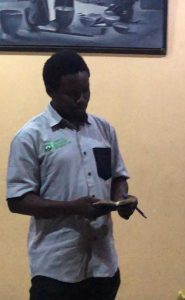
Responding to Journalists on how the 21 states were selected for the exercise, the State Program Officer explained that critical stakeholders in the health sector were carefully selected and engaged by the donors/sponsors of the project to determined states with higher susceptibility to diseases and healthcare needs, as well as states that already have healthcare interventions to avoid wasteful duplication of resources.
“C19EP grant will continue to address issues/gaps in the health systems and infrastructures through strategic interventions to ensure their efficient and effective outcomes are achieved. The C19EP will also integrate the responses of health systems, community systems, and CSOs to any emerging epidemics”; Ms Juliet confirmed as she reeled out successes recorded this year in Delta State to include but not limited to; procurement of herbicide at a cost of ₦7,500 for elimination of weeds by one of the engaged CBO; KRUDI intervention in Cable PHC, Oshimili South LGA, and support of clearing of overgrown weed by Mr. Uzor Amaechi, the Ogbe-Ofu Community Leader through KRUDI CLMT members intervention. The State program Officer however called on the government, private and philanthropic foundations to increase funding of Primary Health Centres, as well as collaboration and support from religious organizations and community stakeholders.
Speaking further, while commending the effort of the government so far, the State Program Officer harped on government prioritizing and increasing the funding for Secondary and Primary Healthcare Centers (PHCs). “Adequate financial support is crucial for these centres to deliver quality healthcare services, including prevention and treatment of infectious diseases such as HIV/AIDS, tuberculosis, malaria, and others to the community. By allocating more resources to healthcare, governments can strengthen infrastructure, enhance workforce capacity, and ensure that essential services are accessible to all.”; Juliet remarked, as she underscored that similar funding and support is expected from philanthropic individuals and organizations to supplement government’s effort.
On support from religious organizations and community stakeholders, the State Program Officer tasked the religious leaders to deploy their influential role on their members in mobilizing them to respond positively to healthcare subscription and avoid resorting to religiosity in healthcare remedy, while indulging community stakeholders to actively support and advocate for their local Secondary and Primary Healthcare Centers and ensuring the sustainability and effectiveness of these centres, as well as volunteer, support and participate in community healthcare interventions.
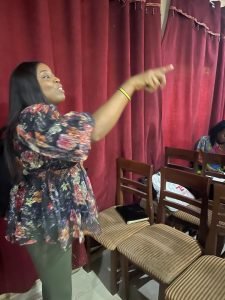
Eminently present at the event were the ATM State Chairpersons and convener, Ms. Juliet Obiajulu, State Chairman of ACOMIN, Mr. Greg Sifo, Director Delta State Agency for the Control of HIV/AIDS (SACA), Mrs. Grace Sifo, Director Planning, Research and Statistics of Delta State Primary Health Care Development Agency, Dr. Eboka Charles, State Chairperson of Network of People Living with HIV and AIDS in Nigeria (NEPWHAN), Mr. Christopher Ogberetitinor, Delta State Epidemiologist, Mrs Nneka Chuka Imarhia. State Chairperson of Tuberculosis Network, Mr. Onyeukwu Chiedozie Miracle, representative of the Christian faith and Pastor Redeemed Christian Church of God, Pastor Oluremi Adeniyi, representative of the Muslim faith and Chief Imam of Asaba Islamic Prayer Group, Dr. Adekola Adekunle, and other CSO/CBO partners.
The State Chairperson of ACOMIN, Mr. Greg Sifo as well as representatives of the partnering agencies took turn to give their goodwill messages as they expressed appreciation to ACOMIN/ATM Network for these community-based healthcare interventions, and charged local government and community-based CSOs/CBOs present to intensify effort in healthcare service delivery.
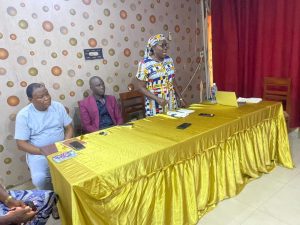
Prominent in the discussion was the Director of Delta State Agency for the Control of HIV/AIDS (SACA), Mrs. Grace Sifo, who assured ACOMIN of their support at the local government level through their LGA representatives called Local Agency for Control of AIDS (LACAs). She pointed out that there is an ongoing integration of all disease programme in the state, and charged the implementing community-based CBOs to create demands for healthcare service deliveries and talk about all disease including HIV/AIDS, Tuberculosis and Malaria, in their community mobilization for health programmes.
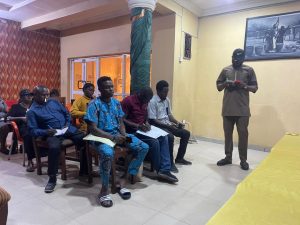
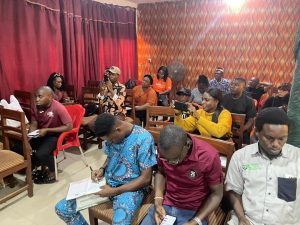
The interactive session involved participants fielding questions from Journalists at the event which covered myriads of public concerns such as the role of religious leaders in sensitizing their faithful against sexual immorality, level of collaboration of religious organizations with ACOMIN, issues of stigmatization of people living with HIV/AIDS and Tuberculosis patients, use of local herbs for treatment of malaria, location, social media presence, spread and staff strength of ACOMIN, State partners and community-based CBOs.
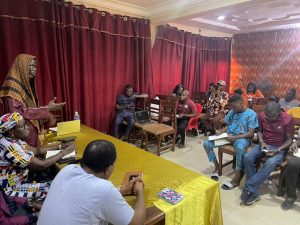
Reacting on some of the questions relating to religious organizations, Dr. Adekola who is the Chief Imam of Asaba Central Mosque and Senior Lecturer/Director of Academic Planning, Federal College of Education (Technical), Asaba, acknowledged that HIV/AIDS are all issues of morality and subjects of sermon for both Christian and Muslim, and therefore everybody wants to live a good life by adhering to the doctrine of morality in the Quran and the Bible as well. He admitted that it is very difficult to completely eradicate immorality but through sustained sensitizations and sermons, immorality can be reduced. On collaborating with institutions that are stepping down HIV/AID programmes, Dr. Adekoya stated that the Mosque has always mobilized Muslim community across Asaba, and allowed individuals, CSOs, State and Federal Government Agencies to come to Mosque and sensitize Muslim adherents on a wide range of issues beneficial to the people, while assuring ACOMIN that he will use the pulpit to ventilate the message to Muslim faithfuls and they will be happy to hear and receive the message from their leader. Giving credence to this, Mrs Grace Sifo of Delta SACA, confirmed that her Agency has been to virtually all the Mosque in Asaba including Cable Mosque and that of Delta State Police Command Headquarters.
Speaking further, the Delta SACA Director advocated that the spread of Malaria should be an issue at the front burner now that the rains has come which creates enabling environment for mosquitoes to multiply and thrive. While condemning local herbs for treatment of Malaria, Mrs. Sifo advocated that people should be predisposed to accessing free drugs for malaria at PHC and procure treated nets for use at home, assuring that the State Government is getting ready for another round of distribution of treated nets.
The event also featured Tuberculosis presentation by the State Coordinator of Tuberculosis Network, Mr. Onyeukwu Chiedozie Miracle, who underscored that the TB Network carry out interventions at local community in terms of contact tracing, sample collections and treatment monitoring. He however highlighted some challenges faced by TB Network in Delta State which include nomadic nature of some TB patients especially the Northerners, inadequate and expensive equipment for clinical tests, amongst others.
Responding to Journalists on the visibility and accessibility of the TB Network in Delta State, Mr. Onyeukwu confirmed that there are all together 12 TB Testing Centres in Delta State which include Federal Medical Centre, Asaba, Warri and Ogwashi-uku Testing Centres, and charged the Media to work with Civil Society Networks to enable our people access free TB services already paid for by donors.
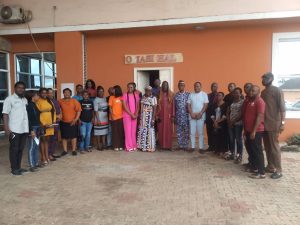
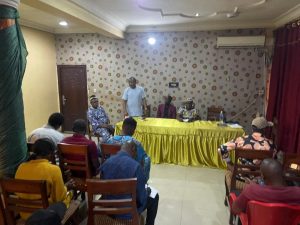
Highpoints of the event were goodwill messages by participating partners, press briefing by the coordinator and convener, interactive question and answer session moderated by the Press, vote of thanks and group photograph.


